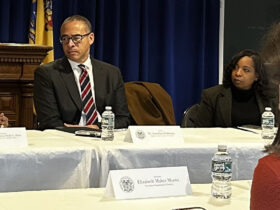 Leading up to each presidential election, every state and territory hold either primaries or caucuses to aid in the nomination of a single representative for each major political party. Despite the clear importance of these elections, the nation has consistently lacked voter participation in primaries and caucuses. For instance, in the 2016 Iowa Caucuses, the first votes of the election cycle, under 15.7% of eligible voters showed at the polls, which was the 8th lowest voter turnout rate in the country. Even the highest voter turnout rate during that same year was just 52.4% in the New Hampshire primaries.
Leading up to each presidential election, every state and territory hold either primaries or caucuses to aid in the nomination of a single representative for each major political party. Despite the clear importance of these elections, the nation has consistently lacked voter participation in primaries and caucuses. For instance, in the 2016 Iowa Caucuses, the first votes of the election cycle, under 15.7% of eligible voters showed at the polls, which was the 8th lowest voter turnout rate in the country. Even the highest voter turnout rate during that same year was just 52.4% in the New Hampshire primaries.
Some correlate low participation in caucuses with the long lines and need for a physical appearance at the polls. While some primaries permit mail-in votes, many have argued that these elections are simply chaotic, unreliable, and messy, particularly demonstrated in the 2020 Iowa Caucuses, where inconsistencies in data sets and technical difficulties in the mobile application delayed results. While those assertions may be true, these elections are essential in communicating citizens’ desires to each presidential candidate.
As stated before, these elections nominate a representative for each political party. Your votes help candidates receive delegates, who are then responsible for choosing these candidates for party representation. If you like Bernie Sanders, for instance, he needs to receive enough votes during the primary and caucus season so that he has a chance to face the nominee for the opposing political party. If not, the possibility of his winning the presidency, let alone the nomination, is near impossible. Simply put, your vote can determine whether or not a candidate’s name will even show up on the election ballot.
Furthermore, winning primaries and caucuses builds momentum and garners more support for candidates. After receiving a certain number of delegates, both the public and candidates can predict their paths towards the presidential election. Especially in earlier elections, after months of campaigning, citizens can finally take a rough look at where the candidates stand. This is why the Iowa Caucuses are held in such high regard: they are the first glimpse into the amount of support each candidate has. Consistently receiving a large number of delegates and votes are signs that a particular candidate is the favorite and will likely win the nomination. In fact, since 1976, six out of the seven elected presidents won either the first caucuses in Iowa or the first primary in New Hampshire. Evidently, these wins push candidates to a likely path towards the presidency, and after obtaining a certain number of delegates, one candidate will reign as the nominee for his or her respective party. On the contrary, those who lose these elections may realize that a nomination will be unlikely, thus choosing to drop out of the race entirely. In the 2016 presidential election, Republican candidate Marco Rubio dropped out after losing the Florida primary, his home state, to current president Donald Trump. Rubio realized his lack of support even within his own state, causing him to suspend his run. Although these losses may be heartbreaking for the candidates and their supporters, it strengthens and fuels other candidates to continue to push their campaigns. After Rubio’s final loss, Trump won nearly every single state primary or caucus and ended up winning the nomination and presidency. If you don’t go out to support your candidate, he or she will not even have the chance to face up against the opposing party.
Finally, primaries and caucuses help unite members within a given party. After each election, candidates who are unlikely to receive the nomination will expectedly drop out of the race. Therefore, former candidates will show support for their peers in order to attempt to defeat the opposing party. For instance, in the 2020 presidential election, former Democratic candidate Bernie Sanders dropped out after being unable to receive enough votes during Super Tuesday, which is when the greatest number of states hold primaries and caucuses. After halting his campaign, Sanders announced his endorsement to fellow Democratic candidate Joe Biden, explaining the need to unite the Democratic party in order to vote Republican President Trump out of office. Primaries and caucuses recenter the focus on the overall election rather than the uproar within a single political party.
The United States struggles with voter participation in the presidential elections in November. Therefore, it is understandable that such data matches the voter participation in presidential primaries and caucuses. However, despite the chaos and malfunctions that occur during these elections, they have immense impact on the presidency down the line, making it necessary for citizens to come out and vote. Choosing to stay home during your state’s primary or caucus can snatch away your candidate’s opportunity to become president even before the November election.














